
|
|
Abstract: Bahá'í activism for human rights, and involvement with Amnesty International. Includes response by Drew Remignanti. Notes: See also a letter from the UHJ clarifying that Bahá'ís may work with, but not hold membership in, Amnesty International, and see Human Rights and Religious Faith. See also list of dialogue articles or image scans. |
Releasing the Captive from His Chains
by Steven Scholl
published in dialogue, 1:1, pages 24-29Los Angeles: 1986
I learned that in extreme situations when human lives and dignity are at stake neutrality is a sin. It helps the killers, not the victims.The Iranian revolution has brought about a renewed awareness among Bahá'ís of the fragile nature of human rights in the modern world. Persian Bahá'ís have experienced first-hand the effects of the Iranian government’s denial of basic rights to them. This blatant example of religious persecution has rallied Bahá'í communities throughout the world to raise their voices in an attempt to stop the cruel torture and execution of innocent believers and to end the harsh economic and social sanctions imposed upon all Iranian Bahá'ís. But, as Juan Cole remarks in his essay “Bahá'ís and Human Rights,” (Circle of Unity) “unless the Bahá'í Community consistently shows a similar zeal for the plight of the oppressed elsewhere, the sincerity of its overall concern with human rights...will be questioned.”
— Elie Weisel
What can we do, then, to become more involved with human rights issues? How can we fulfill ‘Abdu’l-Bahá’s exhortation for Bahá'ís to do more than pay lip-service to the moral obligations of the religious life? What practical programs can we implement in our communities that will “enrich the poor, raise the fallen, comfort the sorrowful, bring healing to the sick, reassure the fearful, rescue the oppressed, bring hope to the hopeless, and shelter the destitute”?
No doubt there are countless ways Bahá'ís can work for the protection of human rights. The recent emphasis on social and economic development within Bahá'í communities throughout the world is an important step forward in this direction. Working for the eradication of illiteracy and hunger and for the preservation of cultural identity and tradition is the heart of the Bahá'í human rights agenda. It is through these efforts that basic human rights can be assured in the long run. But tragically there are times and circumstances when these long-term, grassroots programs must be supplemented by other actions in order to rescue the oppressed and bring hope to the hopeless.
Today more than one-third of the world’s governments systematically torture prisoners to punish, intimidate, and obtain confessions or information. Torture victims include people of all social classes, trades, professions and age groups. Children in El Salvador have been tortured; in Iran small children have been forced to watch their mothers brutalized. Degradation, humiliation and unbearable pain are regularly administered through the power of the state.
In his book Torture, Edward Peters argues that torture inflicted by public authorities for ostensibly public purposes cannot be dismissed as the product of aberrant regimes but must be seen as a dangerous possibility for any state. He cites Stanley Milgram’s psychological experiments at Yale University in which ordinary Americans were easily persuaded to inflict painful electric shocks to others on grounds of scientific investigation. Torture in the hands of government authorities is a horrific expression of the political rationale justifying inhumane acts in service to the state. In the official policies and covert actions of most nations, we are faced with a cruel fact of modern life: any means may be used in order to create societies that reflect particular political ideologies. Today, more than ever before, “Justice is...bewailing its plight, and Equity groaneth beneath the yoke of oppression. The thick clouds of tyranny have darkened the face of the earth, and enveloped its peoples.”
In the tablet just quoted, (Gleanings, pp. 92-98). Bahá'u'lláh instructs us on how to respond to this rising tide of tyranny. “The day of service is now come.... Arise for the triumph of My Cause, and, through the power of thine utterance, subdue the hearts of men. Thou must show forth that which will ensure the peace and well-being of the miserable and down-trodden. Gird up the loins of endeavour, that perchance thou mayest release the captive from his chains, and enable him to attain unto true liberty.” [emphasis added]
Working with Amnesty International is one way we can use the power of our utterance in the service of human rights. Amnesty International is a Nobel Peace Prize winning organization that works impartially to free prisoners of conscience ⎯ men, women, and children imprisoned solely for their beliefs, race, or ethnic origin who have neither used nor advocated violence. Amnesty International pushes for fair and prompt trials for all prisoners of conscience, and to abolish torture and executions. Since it was founded in 1961, Amnesty has worked on behalf of more than 25,000 prisoners around the world. Last year 150 of the prisoners of conscience adopted by groups in the United States were released.
Amnesty International is independent of any government, political group, economic interest or religious creed. The activities of the organization are inspired by the fundamental principles adopted by the member states of the United Nations and, in many cases, ratified as legally binding by international treaty.
Amnesty is strictly impartial in its activities. It does not work against governments but against human rights violations. It does not take sides in disputes and neither supports nor opposes any political, social, or economic system. It applies a single, universal standard ⎯ the body of human rights principles elaborated by the member states of the United Nations ⎯ to all countries, regardless of the ideology of the government or the views of the victims. This commitment to impartiality demands a consistent effort on Amnesty’s part to seek further information about alleged violations and evaluate these reports in a scrupulously non-partisan manner. Amnesty International works specifically for:
- the release of prisoners of conscience: men, women, and children imprisoned for their beliefs, color, sex, ethnic origins, language, or religion, provided they have neither used nor advocated violence;
- fair and prompt trials for all political prisoners;
- an end to torture and executions in all cases.
There are a number of ways Bahá'ís can become involved with Amnesty International. John Healey, Executive Director of Amnesty International USA, explains that “Letter-writing remains the core of our work. More than two decades of work convinces us that every letter, envelope, and stamp can strengthen the lifeline which reaches into prison cells. The letters may not be carefully read, and replies are rarely written. But we know that the letters are not ignored by the government officials to whom they are addressed. The people with power to redress abuses learn from the these letters that individuals, often living thousands of miles away, care about the fates of individual prisoners. Expressions of concern can cross continents to stay the hand of the torturer or to render detention of a person more inconvenient than setting him or her free.”
Bahá'ís may wish to join Amnesty International individually. Amnesty members participate in monthly letter-writing campaigns for prisoners whose cases appear in AIUSA’s newsletter Amnesty Action. Members pay dues annually which, along with their work for the organization, entitles them to vote in elections for the Board of Directors.
There are two ways a Bahá'í community can become involved with Amnesty International: through the Inter-religious Urgent Action Network (IRUAN) and the Amnesty Adoption Group.
IRUAN was established in 1975 on the belief that people of faith have a vital role to play in the elimination of injustice and the practice of torture. All churches, synagogues, religious organizations, and communities in the United States can join this network. Membership in Amnesty International USA is encouraged but not required.
IRUAN works strictly with “emergency” cases that demand immediate action in order to prevent the torture and/or execution of a prisoner. Participation is straightforward and does not demand much time. Local assemblies could officially sponsor community members who feel that this is an effective and appropriate means for Bahá'ís to respond to human rights violations. A suggested annual participation fee of $20.00 will pay for the cost of the Inter-religious Urgent Action Network Resource File and for the monthly Urgent Action appeals (which your group will receive upon returning the coupon on this page.)
Each participating group receives the Resource File which includes general information about the program, guidelines and suggestions for letter writing, a copy of the most recent Amnesty International Report, and a poster for display purposes. Groups choose one day a month, usually a Saturday or Sunday, for regular participation. The desired number of case sheets are mailed to the group the week prior to the day of participation. The case sheets provide participants with background information on the country of arrest, a description of the prisoner’s situation, types of recommended action and the addresses of government officials.
Only a small amount of time is necessary to make an impact. After the case sheet is read and discussed, participants simply write politely worded letters and telegrams expressing their concern for the prisoner. Each month IRUAN groups receive follow-up information regarding the changed circumstances of prisoners for whom they have worked as well as updated information on Urgent Action appeals sent to others on the Urgent Action network.
The formation of an adoption group is a little more complex and demands more time than the IRUAN group. Adoption groups usually consist of between 12 and 20 members, although some have more. There are presently 300 adoption groups in the United States and over 3,000 worldwide in some 50 countries. Groups are usually formed around a religious, neighborhood, club, or factory network.
Each group is assigned two “prisoners of conscience” ⎯ victims who reside in other countries who have been imprisoned for non-violent activities. Group members send material aid to the victims and their families and also launch a mail campaign on behalf of the imprisoned. Letters of encouragement are sent to the victims and polite, carefully worded appeals for justice are sent to the authorities in positions of influence.
If Amnesty International believes that a prisoner may be a prisoner of conscience but lacks conclusive information, the case may be allocated to an adoption group for investigation, and the group will then attempt to obtain the information required for determining the prisoner’s status.
Adoption groups also participate in Amnesty’s country campaigns and special actions, and in issue campaigns and programs such as those for the abolition of torture and abolition of the death penalty. Adoption groups do not just implement Amnesty International techniques. They seek to educate themselves and their community on human rights issues within Amnesty International’s mandate, raise funds for group, national, and international expenses, and prisoner relief.
Being a member of an adoption group requires a certain commitment of time and energy spent in the service of our fellow human beings. As such, working for the release of prisoners of conscience through Amnesty International is a very powerful means of affirming, in a very practical and effective way, our individual commitment to the spiritual bond that unites us with every human being.
And Amnesty International’s letter writing campaigns have proven effective in curbing human rights abuses and have given hope to prisoners of conscience. In approximately 50 percent of the cases studied, the letters and telegrams sent were followed by improvement in the prisoners’ condition: torture was stopped, prison conditions improved, or prisoners were released.
Karel Dyncl, a Czech journalist imprisoned for his political beliefs, wrote after his release: “A political prisoner comes to know about Amnesty’s work on his behalf usually only indirectly, from sarcastic remarks of his jailers or from pieces of information communicated to him by members of his family in their strictly censored letters. But it is enough to give him a wonderful feeling that he is not completely forgotten after all, that somebody cares.”
Julio de Pena Valdez, a trade union leader in the Dominican Republic, was held naked in an underground cell. Amnesty launched a letter writing campaign that prodded Dominican President Joaquin Balaguer to release him. Mr. de Pena recounts that, “When the first 200 letters came, the guards gave me back my clothes. Then the next 200 came, and the prison director came to see me. When the next pile of letters arrived, the director got in touch with his superior. The letters kept coming, 3,000 of them. The President was informed. The letters still kept arriving, and the president called the prison and told them to let me go.
“After I was released, the president called me to his office. He said, ‘How is it that a trade union leader like you has so many friends from all over the world?’ He showed me an enormous box of letters he had received and, when we parted, he gave them to me.”
The Bahá'í community is becoming a more dynamic force for peace and justice in the world. But there is room and need for a wider range of community endeavors. We must put behind us futile debate over whether or not joining with other progressive and humanitarian movements will detract from our teaching efforts. It is time for us to take up the broader definitions of teaching the Faith that Bahá'u'lláh and ‘Abdu’l-Bahá time and again call us to. To do so we must create new forms of Bahá'í activity. For years we have set up committees to direct the teaching work, children’s classes, deepening, feasts and holy days’ observances. Now is the time for the creation of new kinds of Bahá'í committees that can help us broaden the bases of Bahá'í activities in order to take on Shoghi Effendi’s challenge that Bahá'í communities be seen at the forefront of progressive and humanitarian movements.
Bahá'ís at the local level should find loving support, guidance, encouragement and sponsorship from their local spiritual assembly when they feel compelled to organize and work for peace and justice causes. Working with Amnesty International through their adoption groups or the Inter-religious Urgent Action Network is one way we can attempt to put into action Bahá'u'lláh’s and ‘Abdu’l-Bahá’s exhortations for us to resist tyranny, to release the captive from his chains, to rescue the oppressed, and give hope to the hopeless victims of torture.
Steven Scholl is editor of Dialogue.
"Chains": Response by Drew Remignanti, MD in Dialogue 1986, 1:3, p. 7
I have read the first issue of Dialogue and am pleased to find a periodical committed to serving as a forum for ideas and issues related to the Bahá'í Faith. It definitely helps to fill a void. I found the articles to be well written and thought provoking.On the down side, however, I was disturbed by some of the uses of quotations from the Bahá'í scriptures. In “Releasing the Captive from His Chains,” Steven Scholl quotes Bahá'u'lláh: “Gird up the loins of thine endeavour, that perchance thou mayest release the captive from his chains, and enable him to attain unto true liberty.” The frightening aspect of this to me is the apparent literal interpretation of what seems an obviously metaphorical passage in order to justify a position. The phrase “true liberty” is used frequently by Bahá'u'lláh and never strikes me as referring to physical liberty. For instance, in another passage Bahá'u'lláh says, “Say: True Liberty consisteth in man’s submission unto My commandments, little as ye know it.” Obviously one can have true liberty even while in captivity. This mars an otherwise excellent article whose central issue I take no exception to. If one is attempting to convince Bahá'ís to support organizations like Amnesty International, using quotes in this manner may interfere with one’s goal.
In her article “Disinvestment: Is It a Bahá'í Issue?” Marjan Nirou quotes ‘Abdu'l-Bahá from Promulgation of Universal Peace as allowing Bahá'ís to “hold political office.” Dialogue’s non-Bahá'í readers may wonder why they have not heard of any Bahá'í politicians. The quote refers only to avoiding “political movements that lead to sedition” and makes no reference to the broader principle of “non-acceptance of political posts, non-identification with political parties, non-participation in political controversies, and non-membership in political organizations and ecclesiastical institutions,” as outlined by Shoghi Effendi in The Advent of Divine Justice.
Pretty strong words, those of Shoghi Effendi; yet I think they still allow Bahá'ís to become involved with social issues like those dealt with in Dialogue, even though these social movements will have inevitable political impact. The challenge for Bahá'ís is to be aware of the possibility of hidden agendas and to avoid entanglement in partisan issues. In August 18, 1986, issue of Newsweek, Amnesty International, along with America’s Watch Committee, was pointed out as drawing criticism for being “soft on the Sandinistas” in terms of reporting human rights abuses and harder on the contras. This bias may or may not exist, but Bahá'ís who join Amnesty International or any other organization should be careful to align themselves with the principles of the group that are consonant with Bahá'í principles rather than against another party, for example, the Reagan administration.
Response by Steven Scholl in Dialogue 1986, 1:3, pp. 7-8
Drew Remignanti’s objection to my use of a passage from Bahá'u'lláh’s writings raises an interesting point that I would like to briefly discuss. Dr. Remignanti believes that the passage in question, “Gird up the loins of thine endeavour, that perchance thou mayest release the captive from his chains, and enable him to attain unto true liberty,” is to be understood metaphorically, not literally, as I have done. I have now reread the tablet in question several times and remain convinced that Bahá'u'lláh is reinforcing the inner or metaphorical meaning of “true liberty” by references to human rights abuses along with a call to his followers to actively work for justice and peace. Other passages from the tablet in question appear to be clearly summoning us all to be concerned with the literal meaning of oppression and chains. We are told, for instance, to “show forth that which will ensure the peace and well-being of the miserable and down-trodden.” We are reminded that in this day “Justice…is bewailing its plight and Equity groaneth beneath the yoke of oppression” and that the “clouds of tyranny have darkened the face of the earth, and enveloped its people.” If we fail to recognize that Bahá'u'lláh is not merely waxing poetic in passages such as these, we Bahá'ís may use our scriptures to avoid social commitments.Bahá'u'lláh and ‘Abdu’l-Bahá’s writings often make reference to human rights abuses through striking imagery. This is only natural since both were victims of oppressive governments and spent time incarcerated and, in Bahá'u'lláh’s case, in chains. It is undeniable that “true liberty” for Bahá'ís means much more than freedom from torture and abuse, but we should not forget that the central figures of our faith, as victims of human rights violations, speak compellingly for spiritual and physical release from their bondage. My reading of their lives and teachings is that they call on us not to passively accept the status quo of tyranny but to actively work for justice and peace.
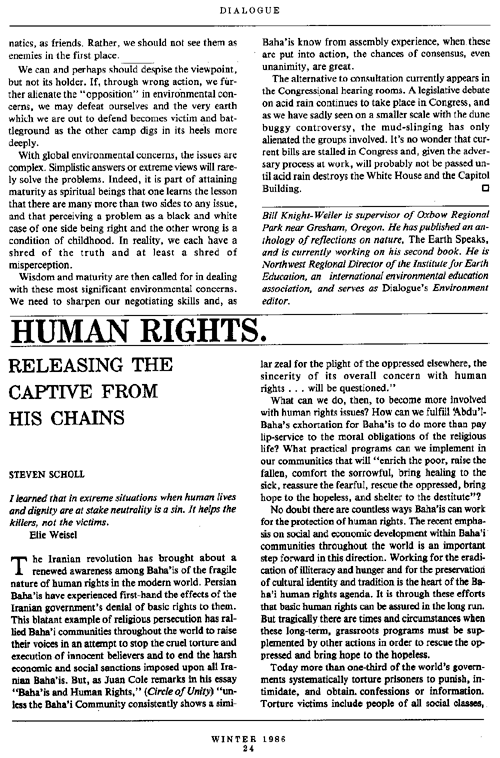 click for larger image |
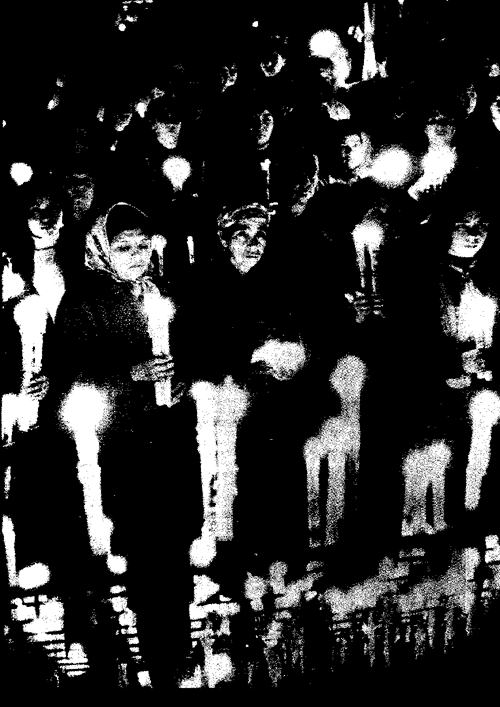 click for larger image |
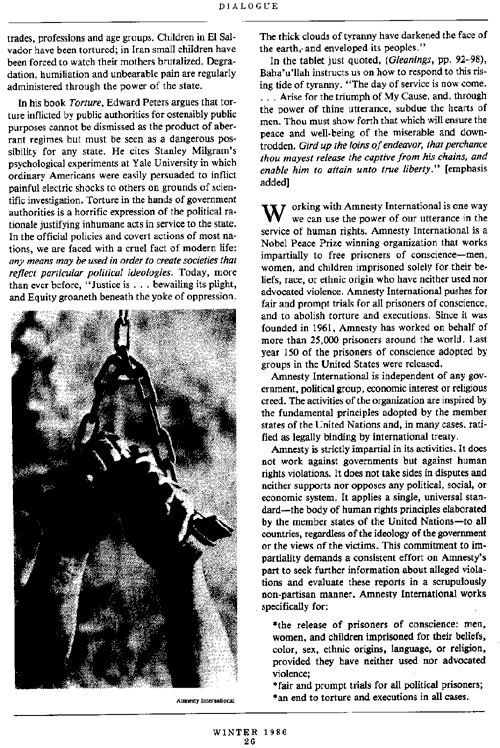 click for larger image |
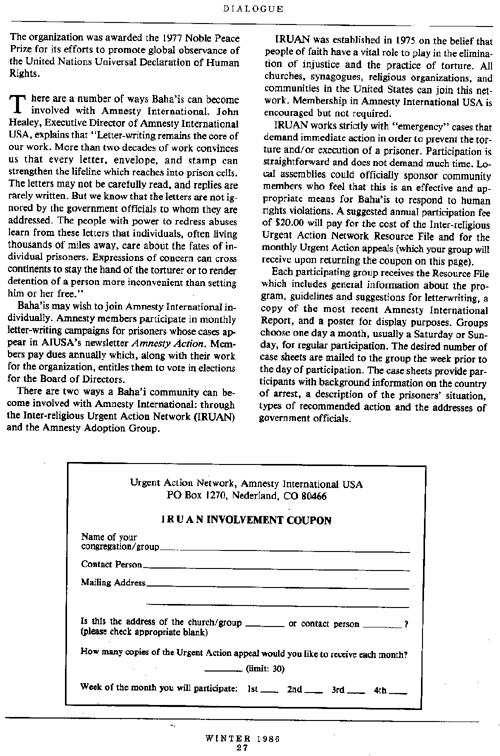 click for larger image |
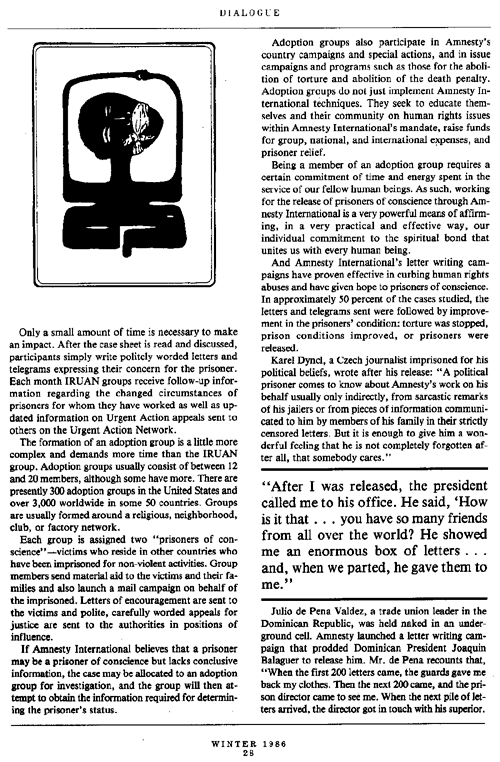 click for larger image |
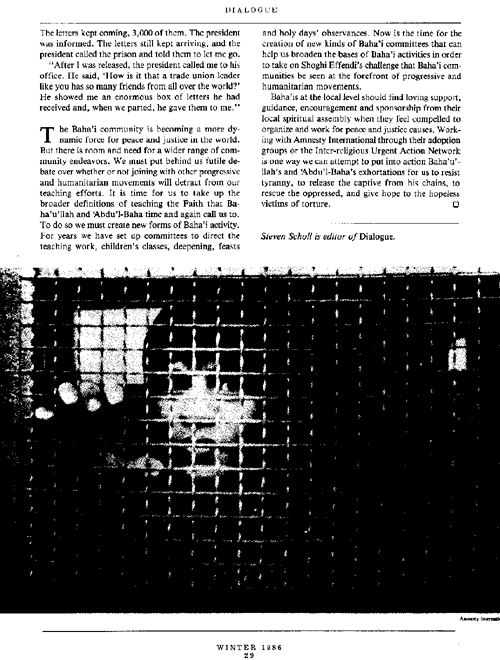 click for larger image |
Response by Drew Remignanti, in Dialogue 1986, 1:3, and response by Steven Scholl |
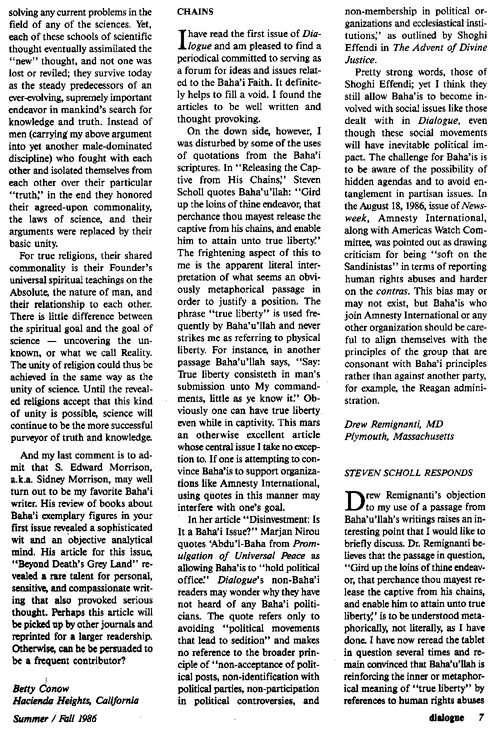 click for larger image |
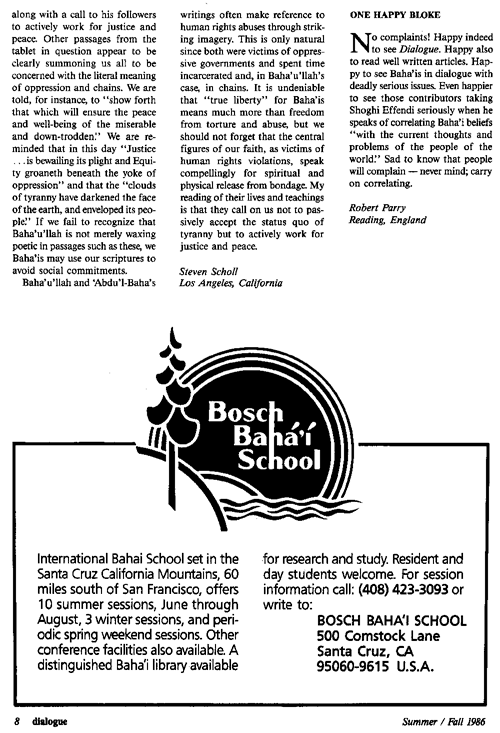 click for larger image |
|
|